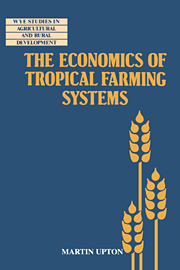Book contents
- Frontmatter
- Contents
- Preface
- Part I Farm household economics
- 1 Farming systems in economic development
- 2 The farmer's environment
- 3 The farmer's production choices
- 4 Labour and leisure
- 5 Costs, scale and size
- 6 Risk avoidance
- Part II Rural resource economics
- Part III Field investigations
- Part IV Farm planning
- Index
2 - The farmer's environment
Published online by Cambridge University Press: 05 June 2012
- Frontmatter
- Contents
- Preface
- Part I Farm household economics
- 1 Farming systems in economic development
- 2 The farmer's environment
- 3 The farmer's production choices
- 4 Labour and leisure
- 5 Costs, scale and size
- 6 Risk avoidance
- Part II Rural resource economics
- Part III Field investigations
- Part IV Farm planning
- Index
Summary
The natural environment
Human societies have always exploited the natural environment to meet the necessities of life. In doing so the balance of nature, or ecological equilibrium is altered. Hunters and gatherers, by harvesting certain species of wild animals and plants, reduce the population, or biomass, of these species. By grazing the natural rangelands, pastoralists' herds may displace some of the natural fauna, and change the pasture composition. Cultivators modify the environment more drastically by clearing the natural vegetation, and growing new kinds of plants. Under irrigation, the amount of water available for plant growth is increased, thereby transforming the environment and allowing the introduction of exotic crops. Thus agriculture creates new man-made environments or agricultural ecosystems.
Despite the ability of cultivators and herders to modify the natural environment, choices of farming system, crop and livestock enterprises and methods of production are constrained by the climate, soils and biology of the region. Tropical climates are characterized by high levels of solar energy incidence, almost twice as much as is received in temperate zones in the growing season. It should be noted, however, that over 25 per cent of land within the tropics is above 900 m in altitude and is therefore subject to lower temperatures and higher rainfall, than the neighbouring lowlands. Temperate crops such as wheat and barley may be grown, while the keeping of exotic breeds of livestock raises fewer problems than in the hotter tropical lowlands.
- Type
- Chapter
- Information
- The Economics of Tropical Farming Systems , pp. 24 - 48Publisher: Cambridge University PressPrint publication year: 1996
- 1
- Cited by

